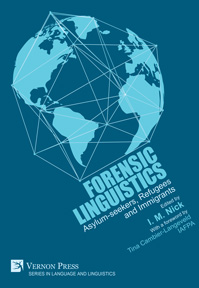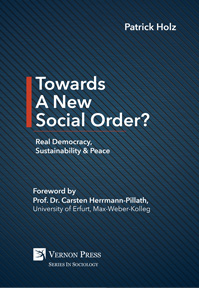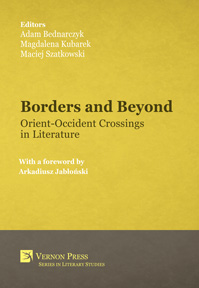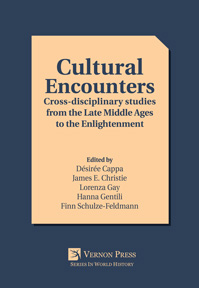Making Strangers: Outsiders, Aliens and Foreigners
Abbes Maazaoui (Ed.)
by Jeffrey R. Wilson (Harvard University), Abigail Taylor (University of Sydney, Australia), Amanda McMenamin (Wilson College, PA), Laureano Corces (Fairleigh Dickinson University, NJ), Marguerite Bordry (Université Sorbonne Nouvelle – Paris, France), Ezra Engling (Eastern Kentucky University), Chia-Sui Lee (National Taiwan University, Taiwan), Yubraj Aryal (The University of Montreal, Canada; Central Normal China University, China), Shastri Akella (The University of Massachusetts), Amandine Guyot (Université Paris 13 – Villetaneuse, France), Beatriz Calvo-Peña (Barry University, FL), Walid Romani (The Université du Québec in Montréal, Canada)
Purchase this book
(click here to change currency)
For this collection of essays, Abbes Maazaoui has chosen a theme of clear relevance to current events: the movement of masses of people from one culture to another has become, in the 21st century, a pressing topic across the globe. The phenomenon can be problematic for those who are uprooted and to whom Maazaoui’s terms—strangers, outsiders, aliens, foreigners—are applied, and, as well, for those who apply these terms to their new fellow citizens. To explore dimensions of this global problematic, Maazaoui has secured contributions from scholars located across the United States and from Canada, France, Taiwan, and Australia. Two articles focus directly upon the contemporary situation: the predicament of the DREAMers (children brought illegally into the country) in the United States and the “crisis of hospitality” as France struggles to align its republican ideals with its response to recent immigrants and asylum seekers. Most of the scholars focus their contributions upon specific literary texts; employing a variety of approaches, they interrogate these texts to reveal implications for the complex problems of national identity and immigrant experience that are vexing the Western world in the first decades of this century.
It is the volume’s diversity that is most impressive: the diversity of the contributors, but especially the diversity of the texts that they examine, which range from a Shakespearean contribution to Sir Thomas More (1603), to an 1833 Spanish novel set in the Middle Ages by the Duke of Rivas, to a 2014 British novel set in 2008 by the Bangladesh-born Zia Haider Rahman. Each scholar reads the chosen text as a literary construct, but also as a document that reveals ways of thinking about the experiences of strangers in strange lands. The social and political dimensions of those experiences, whether they transpire in medieval Spain, Renaissance England, or contemporary Asia, Europe, and North America, are shown to cast light upon difficulties faced by today’s massive migrations: by the challenges confronting the migrants themselves, but also by the challenges confronting the various cultures to which (and from which) they have migrated. Making Strangers is thus a most timely volume of social and literary criticism.
Dr. J.K. Van Dover
Fulbright Professor, American Studies, Comenius University, Slovakia
With the extraordinary – but oh so logical – premise that no one is a stranger by nature, but becomes one, is made out to be one, "Making Strangers: Outsiders, Aliens and Foreigners" examine, through language, literature, geography and the concept of identity, the nature, past and present, of this foreignness, a series of contemporary and universal interrogations that could not come at a better time here. From 16th century England to 19th-century Spain to today’s France, we learn, in the first section, that language has often been used as a political weapon to shame, manipulate and colonize the Other. Given the broad range in time and space of this section, this first part proves to be particularly strong, academically, and the authors of the five well-researched articles succeed here in joining history, fiction and reality, a mix which proves to be eminently interesting and useful. The following two sections, particularly the second one, on “alien geographies”, concentrate on the idea of representation in its various expressions in the field of literature, while always keeping in mind the notion of reality, which the reader can never help referring to, consciously or not. This is where Prof. Maazaoui’s Introduction proves to be particularly useful, because of the wide variety of literary references which could easily lose the reader; this well thought and concise introduction can and should, therefore, be used a guidebook, so the direction of the book is never forgotten. The third section, on “trouble identities”, despite having only three articles, efficiently create this perilous link between reality and fiction, between literature and everyday life. Amandine Guyot’s text on Conan Doyle is particularly brilliant in linking one famous detective and the concept of British imperialism and foreignness.
Overall, this collection of essays proves to be a shocking voyage to the burning frontiers of identity and current affairs, where the foreigners are not always the ones you think.
Dr. Jean Levasseur
Bishop's University, Canada
The book is a compelling read for anyone who is seeking a grounded explanation for the complexities that haunt today’s world but has not looked into literature for answers. Through a well-researched selection of articles by renowned scholars from all over the world, this book looks at the concept of strangeness as a made-up convention and presents a unique approach to our understanding of issues like immigration, genocide, colonization, nationalism, undue labeling of others, cultural identities, the refugee crisis and Brexit. In effect, one of the book’s strongest points is its wide-reaching and well-thought-out analysis of concepts like the use of language as a weapon of power, the identities of those who live between two cultures and the negative labeling of others as strangers, outsiders, foreigners and aliens.
Although the book accomplishes its goal of shedding light on the age-old complexities of humankind, the work must be continued with further publications. Strangeness is a recurring theme in literature, and this constitutes a unique opportunity to understand, and possibly reconsider, how we as humans behave at a personal, social, economic and political level.
Professor María Isabel Charle Poza
Lincoln University, USA
This timely book, 'Making Strangers', with an insightful Introduction by Abbes Maazaoui, is organized according to four denominations: Strangers, Outsiders, Aliens, and Foreigners. Twelve essays, very well researched, treat the problems of “difference” in relation to the identity of the self. The three parts are very well structured around “Languages of power,” “Alien geographies,” and “Troubled identities.” A historical perspective balances the problems and events of today. Indeed, this book discusses in depth what A. Khatibi calls “the untreatable Difference,” or what I have called “the otherness of others.” The displacement of people and the actual phenomenon of immigration have given way to a systematic redefinition not only of the notion of identity but of the immigrants who are transplanted, moving from one region or locale to another. In his Introduction, Maazaoui emphasizes the human “urge to categorize” what we do not understand. The "Us" and "Them" have always been categorized in terms of power, movement, politics and geography, and in relation to social, ontological, literary, national and international themes. The diversified texts of the book and their varied approaches shed new light on this contemporary burning issue. I highly recommend it for its diverse angles of vision on the problematic of the “outsider."
Prof. Dr. Hédi Bouraoui
York University, Canada
Studies on foreignness have increased substantially over the last two decades in response to what has been dubbed the migration/refugee crisis. Yet, they have focused on specific areas such as regions, periods, ethnic groups, and authors. Predicated on the belief that this so-called “twenty-first century problem” is in fact as old as humanity itself, this book analyzes cases based on both long-term historical perspectives and current occurrences from around the world. Bringing together an international group of scholars from Australia, Asia, Europe, and North America, it examines a variety of examples and strategies, mostly from world literatures, ranging from Spain’s failed experience with consolidation as a nation-state-type entity during the Golden Age of Castile, to Shakespeare’s rhetorical subversion of the language of fear and hate, to Mario Rigoni Stern’s random status at the unpredictable Italian-Austrian borders, to Lawrence Durrell’s ambivalent approach to noticing the physically visible other, to the French government’s ongoing criminalization of hospitality, to Sandra Cisneros’s attempt at straddling two countries and cultures while belonging to neither one, to the illusive legal limbo of the DREAMers in the United States.
We are not born foreigners; we are made. The purpose of the book is to assert, as denoted by the title, this fundamental premise, that is, the making of strangers is the result of a deliberate and purposeful act that has social, political, and linguistic implications. The ultimate expression of this phenomenon is the compulsive labeling of people along artificial categories such as race, gender, religion, birthplace, or nationality. A corollary purpose of the book is to help shed light worldwide on one of the most pressing issues facing the world today: the place of “the other” amid fear-mongering and unabashedly contemptuous acts and rhetoric toward immigrants, refugees and all those excluded within because of race, gender, national origin, religion and ethnicity. As illustrated by the examples examined in this book, humans have certainly evolved in many areas; dealing with the “other” might not have been one of those. It is hoped that the book encourages reflection on how the arts, and especially world literatures, can help us navigate and think through the ever-present crisis: the place of the “stranger” among us.
Acknowledgments
Introduction
Abbes Maazaoui
Part one: Languages of power
1. “You must needs be strangers”: stigma and sympathetic imagination in Shakespeare’s Sir Thomas More
Jeffrey R. Wilson, Harvard University, United States
2. (E)stranging the modern nation: transnationalism and bastard border crossings in the Duke of Rivas’s The Foundling Moor
Amanda Eaton McMenamin, Wilson College, United States
3. “A Dream Deferred”: DREAMers in Politics and the Arts
Beatriz Calvo-Peña, Barry University, United States
4. “Crimes of solidarity”: France’s contemporary crisis of hospitality
Abigail Taylor, University of Sydney, Australia
Part two: Alien geographies
5. Outcast, foreign worker, enemy: exile and suspended identity in Mario Rigoni Stern’s Storia di Tönle (1978)
Marguerite Bordry, Université Paris-Sorbonne, France
6. In search of a home of one’s own: Sandra Cisneros’ The House on Mango Street
Ezra S. Engling (ret.), Eastern Kentucky University, United States
7. Blind spots, tunnel vision, and the narratives of the immigrant and colonial subject
Laureano Corces, Fairleigh Dickinson University, United States
8. The Arab who wasn’t there: alterity in Lawrence Durell’s Alexandria Quartet
Walid Romani, The Université du Québec à Montréal, Canada
9. The ethics of the ghostly: a ghost medium in J. M. Coetzee’s Life & Times of Michael K
Chia-Sui Lee, National Taiwan University, Taiwan
Part three: Troubled identities
10. Strangers, foreigners and aliens in Conan Doyle’s novels: from imperialistic appropriation to literary subversion
Amandine Guyot, Université Paris 13, France
11. A strange encounter of aesthetics and imperial politics in Alex Strick van Linschoten and Felix Kuehn’s Poetry of the Taliban
Yubraj Aryal, University of Montreal, Canada / Central Normal China University, China
12. Aesthetics of alienation: the displacement/displacing narrative of In the Light of What We Know
Shastri Akella, University of Massachusetts (Amherst), United States
Contributors
Index
Abbes Maazaoui is Professor of French and Linguistics at Lincoln University of Pennsylvania. His books include The Arts of Memory and the Poetics of Remembering (2016), Proust et la claustration and La Rhétorique du leurre dans Les Gommes d’Alain Robbe-Grillet. He has also edited special issues on Us and Them (2017), Panopticon: Surveillance, Suspicion, Fear (2016), Borders (2014), and Follow Your Passion: Representations of Passion in the Humanities (2013). His essays on literary criticism and twentieth-century French and Francophone literature have appeared in Romance Notes, The French Review, Romance Quarterly, Etudes francophones, L’Esprit créateur, and in various critical collections. He is the founder and editor of The Lincoln Humanities Journal, and a member of the editorial board of the Revue du Centre d’Etudes des Littératures et des Arts d’Afrique du Nord (CELAAN).
Maazaoui’s interest in the experiences of the stranger came naturally to him. Not only has he lived in three countries (Tunisia, France and the United States), his family and brothers and sisters have also been scattered across three continents and nationalities. The theme of border crossings has been present in many of his publications, including two recent special issues for The Lincoln Humanities Journal, the first on Borders (2014), and the second on Us and Them (2017). In the spring of 2017, he taught a course on Human Diversity in French and Francophone Thought (“Nous et les autres dans la pensée française et francophone”), and coordinated an international conference on “Making Strangers.” This book is an extension of both the conference and the course.
Foreignness, Sympathy, DREAMers, Colonial subject, Ghosts, Alienation, Displacement, Transnationalism, migration, securitarianism, Calais’s Jungle, Julia Kristeva, Tzvetan Todorov, Kunal Parker
See also
Bibliographic Information
Book Title
Making Strangers: Outsiders, Aliens and Foreigners
ISBN
978-1-62273-324-8
Edition
1st
Number of pages
188
Physical size
236mm x 160mm

![Making Strangers: Outsiders, Aliens and Foreigners [Hardback]](/file/5388/9935e52aa782c0268379b3ee4e4d71d9/1519128877.jpg)







